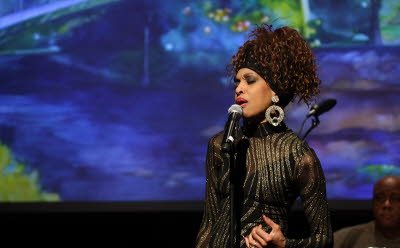Loretta Holloway: ‘There Will Always Be Room for Jazz’
The American vocalist talks to us about the modern state of jazz, her upcoming India show and more

Loretta Holloway will perform at Mumbai's Royal Opera House this month. Photo: Courtesy of the artist
The beauty with jazz musicians is that they are different from each other in the way they express themselves either on their instruments or in song. This uniqueness is perhaps what separates jazz musicians from the rest. This quality of uniqueness is especially true of jazz vocalists. Their phrasing of lyrics, their sense of time, their expression of a song varies considerably from one singer to another.
Mumbai has had the rare opportunity in recent times of being exposed to a few American jazz singers. Recently, Ann Hampton Callaway performed a couple of concerts in this city; another American jazz vocalist Megan Powers is to perform on August 15th with the group TAKE 5.1 and on August 21st, Loretta Holloway will be displaying her jazz vocal talents for Mumbai jazz fans. Later this year Shary Rose, a vocalist from Columbia in South America will also be performing in the city.
Holloway is from South Carolina in the U.S., the state which also boasts of being the home state of jazz greats Dizzy Gillespie and Eartha Kitt. Ahead of her India trip, we engaged in a conversation with Loretta to find out about her talent and jazz perspective. Here are excerpts from our interview with Holloway:
How did you get into jazz singing and at what age did you first perform on stage?
My first professional stage gig was with the Skip Pearson Jazz Ensemble in Orangeburg, S.C. Skip Pearson was bandleader and saxophonist. He became my first jazz mentor. He had identified me as a jazz singer when he heard me rehearsing as a freshman in college. He said my voice was more suited to jazz than R&B and introduced me to the sounds of Billie Holiday, Nancy Wilson, Ella, Sarah and Lena Horne. Skip Pearson was also our state’s official jazz ambassador!
In the long history of jazz, every generation has taken something from their predecessors and moved the art to another level. Have the great divas of jazz been a source of concepts and inspiration to you? Who has been your biggest inspiration?
My early singing style was influenced by jazz legend Nancy Wilson and pop icon Barbra Streisand. I listened to their enunciation of lyrics, especially the song standards of Nancy Wilson. I also was influenced by Streisand’s songs from the early part of her career. I loved the classy and dramatic delivery of Lena Horne. Critics have dubbed me the “singing actress” as I sing a song as a ‘dramatic piece’ and often use song lyrics as dialog! I have also learned that there is power in ‘being quiet’ – whisper of a lyric will draw my audience closer to me. I go with the concept of less is more. I named my debut CD, Quietly.
 Has the use of electronic instruments influenced jazz vocalists – you in particular to any degree?
Yes, most definitely. As a jazz singer I love the sounds of acoustic piano, acoustic bass and drums. However, there is a certain embellishment when the electric piano is used with lush string effects or horn patterns. Electric instruments also allow the artist to experiment with different sounds and effects because of their flexibility.
Where is jazz music headed at this time – both vocal and instrumental, in terms of popularity? How does the future of jazz look to you?
There will always be room for jazz, whether straight ahead or the classic song book standards. New jazz radio programs, new jazz artists keep on emerging.
A lot of young people are getting academic about jazz. Do you think jazz as music can actually be studied or is it a more instinctive and individual art form for which early mentoring and inspirations are the main factors?
Granted that there are many things (about jazz) that can’t be learned from books but rather by finding one’s own way and sound, but learning the fundamentals of jazz, reading music and being educated in the history of the music are important. These trends can only enrich a student’s experience as a jazz artist. I never learnt to read music; it’s not too late and could make me a better artist perhaps.
What are you expecting from your India trip? Do you have a message for your listeners in India?
I am looking forward to performing at the historic Royal Opera House! The message I wish to share through my music with my listeners is that in the time we will spend together, we will laugh and sing and realize that we have more things that can unite us and enrich each other.
Click here for tickets.Â



